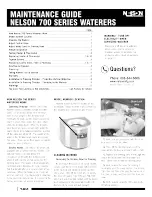
Page 12
d) It is preferable for the discharge to be visible at both the tundish and the fi nal point
of discharge but where this is not possible or practically diffi cult there should be
clear visibility at one or other of these locations. Examples of acceptable discharge
arrangements are:
1. Ideally below the fi xed grating and above the water seal in a trapped gulley.
2. Downward discharges at a low level; i.e. up to 100mm above external surfaces
such as car parks, hard standings, grassed areas etc are acceptable providing that
where children play or otherwise come into contact with discharges, a wire cage
or similar guard is positioned to prevent contact whilst maintaining visibility.
3. Discharges at a high level; e.g. into metal hopper and metal down pipe with the
end of the discharge pipe clearly visible (tundish visible or not) or onto a roof
capable of withstanding high temperature discharges of water and 3m from
any plastic guttering systems that would collect such discharges.
4. Where a single pipe serves a number of discharges, such as in blocks of fl ats,
the number served should be limited to not more than 6 systems so that any
installation can be traced reasonably easily. The single common discharge pipe
should be at least one pipe size larger than the largest individual discharge pipe
to be connected. If unvented hot water storage systems are installed where
discharges form safety devices may not be apparent i.e. in dwellings occupied by
blind, infi rm or disabled people, consideration should be given to the installation
of an electronically operated device to warn when discharge takes place.
Safety
The safety devices supplied or fi tted on an Stainless Lite are selected for their suitability
for the temperatures and pressures involved. They must not be changed, removed or
by-passed and it is essential that only genuine replacement parts supplied or approved
by Gledhill Building Products Limited are used. This includes the immersion heaters,
which must incorporate an energy cut-out. All parts are available to approved installers
from Gledhill Building Products Limited, Sycamore Estate, Squires Gate, Blackpool
(Telephone 01253 474402).
Stainless Lite HP model without
solar heating system
P&T Relief Valve
Tundish
Hot Outlet
To Drain
PRV
ERV
NRV
Stop
Tap
Kitchen
Cold
Tap
Combination
Valve
Balanced
Cold
Outlets
Expansion
Vessel
Heat Pump
Return
Secondary
Return Circuit
Non Return
Valve
Pump
Stainless Lite HP model with
solar heating system
Secondary
Return Circuit
Heat Pump
Flow
P&T Relief Valve
Tundish
Hot Outlet
To Drain
PRV
ERV
NRV
Stop
Tap
Kitchen
Cold
Tap
Combination
Valve
Balanced
Cold
Outlets
Expansion
Vessel
Heat Pump
Return
Solar Return
Solar Flow
Non Return
Valve
Pump
Heat Pump
Flow
Combination Inlet Group
Combines elements 1, 2 and 3 below.
1. Pressure Reducing Valve - This must be fi xed
near the cylinder. The cold water supply to
any mixer taps/showers must be taken from
the cold water tapping of this valve to ensure
balanced hot and cold pressures. This valve
is factory set to ensure the correct operating
pressure for the Stainless Lite.
2. Non Return Valve - This is integral with the
pressure reducing valve to prevent backfl ow
of hot water towards cold water draw off
points.
3. Cold Water Expansion Relief Valve - This safety
device is preset at the factory and will relieve
excess cold water pressure resulting from a
fault condition.
INSTALLATION
INSTALLATION
Содержание StainlessLite HP180IND
Страница 17: ...Page 17 INSTALLATION INSTALLATION ...
Страница 26: ...Page 26 BENCHMARK ...
Страница 27: ...Page 27 BENCHMARK ...
Страница 28: ...Page 28 NOTES ...
Страница 29: ...Page 29 NOTES ...













































